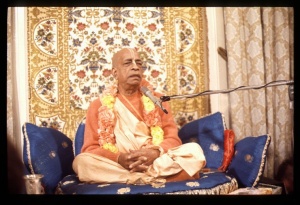CC Antya 1.153 (1975): Difference between revisions
(Vanibot #0027: CCMirror - Mirror CC's 1996 edition to form a basis for 1975) |
(Vanibot #0020: VersionCompareLinker - added a link to the Version Compare feature) |
||
| Line 2: | Line 2: | ||
<div style="float:left">'''[[Sri Caitanya-caritamrta (1975)|Śrī Caitanya-caritāmṛta (1975)]] - [[CC Antya (1975)|Antya-līlā]] - [[CC Antya 1 (1975)|Chapter 1: Śrīla Rūpa Gosvāmī's Second Meeting With the Lord]]'''</div> | <div style="float:left">'''[[Sri Caitanya-caritamrta (1975)|Śrī Caitanya-caritāmṛta (1975)]] - [[CC Antya (1975)|Antya-līlā]] - [[CC Antya 1 (1975)|Chapter 1: Śrīla Rūpa Gosvāmī's Second Meeting With the Lord]]'''</div> | ||
<div style="float:right">[[File:Go-previous.png|link=CC Antya 1.152 (1975)|Antya-līlā 1.152]] '''[[CC Antya 1.152 (1975)|Antya-līlā 1.152]] - [[CC Antya 1.154 (1975)|Antya-līlā 1.154]]''' [[File:Go-next.png|link=CC Antya 1.154 (1975)|Antya-līlā 1.154]]</div> | <div style="float:right">[[File:Go-previous.png|link=CC Antya 1.152 (1975)|Antya-līlā 1.152]] '''[[CC Antya 1.152 (1975)|Antya-līlā 1.152]] - [[CC Antya 1.154 (1975)|Antya-līlā 1.154]]''' [[File:Go-next.png|link=CC Antya 1.154 (1975)|Antya-līlā 1.154]]</div> | ||
{{CompareVersions|CC|Antya 1.153|CC 1975|CC 1996}} | |||
{{RandomImage}} | {{RandomImage}} | ||
==== TEXT 153 ==== | ==== TEXT 153 ==== | ||
<div class="verse"> | <div class="verse"> | ||
:gṛhāntaḥ khelantyo nija-sahaja-bālyasya balanād | :gṛhāntaḥ-khelantyo nija-sahaja-bālyasya balanād | ||
:abhadraṁ bhadraṁ vā kim api hi na jānīmahi manāk | :abhadraṁ bhadraṁ vā kim api hi na jānīmahi manāk | ||
:vayaṁ netuṁ yuktāḥ katham aśaraṇāṁ | :vayaṁ netuṁ yuktāḥ katham aśaraṇāṁ kā api daśāṁ | ||
:kathaṁ vā nyāyyā te prathayitum udāsīna-padavī | :kathaṁ vā nyāyyā te prathayitum udāsīna-padavī | ||
</div> | </div> | ||
| Line 20: | Line 19: | ||
<div class="synonyms"> | <div class="synonyms"> | ||
gṛha-antaḥ khelantyaḥ—who were engaged in childish play within the house; | gṛha-antaḥ-khelantyaḥ—who were engaged in childish play within the house; nija—one's own; sahaja—simple; bālyasya—of childhood; balanāt—on account of influence; abhadram—bad; bhadram—good; vā—or; kim api—what; hi—certainly; na—not; jānīmahi—we did know; manāk—even slightly; vayam—we; netum—to lead; yuktāḥ—suitable; katham—how; aśaraṇām—without surrender; kām api—such as this; daśām—to the condition; katham—how; vā—or; nyāyyā—correct; te—of You; prathayitum—to manifest; udāsīna—of carelessness; padavī—the position. | ||
</div> | </div> | ||
| Line 27: | Line 26: | ||
<div class="translation"> | <div class="translation"> | ||
'I was engaged in My own playful activities in My home, and because of My childish innocence I did not know right from wrong. Therefore, is it good for You to have forced us into being so much attracted to You and then to have neglected us? Now You are indifferent to us. Do You think that is right?' | |||
</div> | </div> | ||
| Line 34: | Line 33: | ||
<div class="purport"> | <div class="purport"> | ||
This verse (Vidagdha-mādhava 2.46) is spoken to Kṛṣṇa by Śrīmatī Rādhārāṇī. | This verse ( Vidagdha-mādhava 2.46) is spoken to Kṛṣṇa by Śrīmatī Rādhārāṇī. | ||
</div> | </div> | ||
Latest revision as of 20:11, 26 January 2020

A.C. Bhaktivedanta Swami Prabhupada
TEXT 153
- gṛhāntaḥ-khelantyo nija-sahaja-bālyasya balanād
- abhadraṁ bhadraṁ vā kim api hi na jānīmahi manāk
- vayaṁ netuṁ yuktāḥ katham aśaraṇāṁ kā api daśāṁ
- kathaṁ vā nyāyyā te prathayitum udāsīna-padavī
SYNONYMS
gṛha-antaḥ-khelantyaḥ—who were engaged in childish play within the house; nija—one's own; sahaja—simple; bālyasya—of childhood; balanāt—on account of influence; abhadram—bad; bhadram—good; vā—or; kim api—what; hi—certainly; na—not; jānīmahi—we did know; manāk—even slightly; vayam—we; netum—to lead; yuktāḥ—suitable; katham—how; aśaraṇām—without surrender; kām api—such as this; daśām—to the condition; katham—how; vā—or; nyāyyā—correct; te—of You; prathayitum—to manifest; udāsīna—of carelessness; padavī—the position.
TRANSLATION
'I was engaged in My own playful activities in My home, and because of My childish innocence I did not know right from wrong. Therefore, is it good for You to have forced us into being so much attracted to You and then to have neglected us? Now You are indifferent to us. Do You think that is right?'
PURPORT
This verse ( Vidagdha-mādhava 2.46) is spoken to Kṛṣṇa by Śrīmatī Rādhārāṇī.